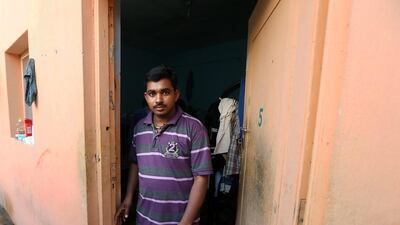ABU DHABI // An impoverished farmer in India whose son was one of 13 workers killed in the Dubai bus crash spoke on Tuesday of his family’s grief, their shattered dreams and his struggle with debt.
Ramchand Gupta, 50, borrowed money from relatives to send his son Sanjay to the UAE four months ago in the hope of a better life. The plan was that he would repay the debt with some of the money Sanjay sent home from his Dh1,200-a-month wage as a pipe-fitter.
But Sanjay and 12 colleagues from India and Bangladesh died when the bus taking them from their accommodation in Umm Al Quwain to work in Jebel Ali on May 10 ploughed into a stationary lorry on Emirates Road. Sanjay left behind in India a wife, a little girl aged 18 months and a boy aged 4, and an extended family.
“All the dreams are shattered,” his grieving father said on Tuesday at his home in Uttar Pradesh state in northern India. “In four months, destiny played a horrific game and snatched my son, leaving us in frightening darkness.”
Sanjay’s wife and children cry all day and the little boy and girl ask for their father, Mr Gupta said.
He borrowed 30,000 rupees, just under Dh2,000, to send his son to Dubai, and has not been able to pay any of it back.
“Already I had debt. But I borrowed this amount hoping that quickly I’ll repay them as soon as my son starts remitting money.
“My son was the only source of assistance – now who will finance our expenses?
“I am shuttling between administrative and judicial department offices to collect the required documents to send to Dubai to help claim compensation.”
Sanjay’s cousin Bhagedan Gupta, 27, who lives in Umm Al Quwain and works as a metal fabricator in Sharjah, has been authorised by the family to take up the compensation issue.
“I have approached a lawyer in Dubai and I am arranging documents,” he said.
“The major problem with Sanjay’s family is that he left behind two very young children and the concern now is about their upbringing.”
The bodies of the 13 victims, nine from India and four from Bangladesh, were finally repatriated last week, more than 10 days after the crash.
The delay was attributed to paperwork, and airline regulations stipulating that only two bodies could be carried on a flight, the Indian consulate said.
The cost of repatriation and tickets for accompanying relatives was met by the victims’ employer.
“By Thursday all four Bangladeshi bodies were sent back, where they performed the last rites and buried them. But it took too much time,” said Mohammed Ahmed, whose nephew Nazrul Islam, 28, was one of the Bangladeshi victims.
Nazrul’s mother, 65, suffers from heart disease and he was aiming to save money for treatment.
“The next step is to fight for compensation,” said Mr Ahmed, who has lived in the Sonapur labour camp in Dubai for the past six years.
Some of the victims’ relatives are expected to file individual cases for compensation, but others will go through the consulates here because they can help with court procedures and documents.
Dubai police have already filed the case to Public Prosecution. The court will decide who is liable and order them to pay compensation, said Nizanur Rahman, the first secretary of labour at the Bangladeshi consulate in Dubai.
Those held responsible then approach their insurance company to deposit the compensation with the court. Once all the money is deposited, the victims authorise representatives to file a case to claim the money, said Mr Rahman.
He said he hoped the process would take two to three months but sometimes it could take up to a year.
The Indian embassy has a free, 24-hour inquiry helpline at 800 46342 (800-India) in English, Hindi, Tamil, Malayalam and Telugu.
anwar@thenational.ae

